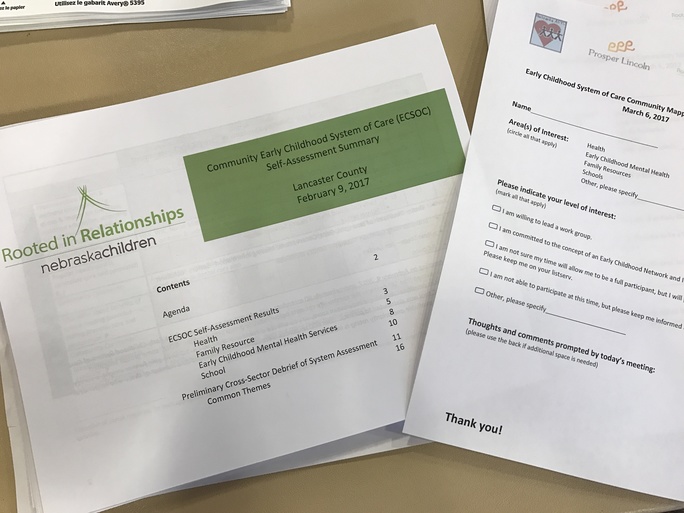Published 3-28-2017
A community-wide collaborative group of more than 100 individuals focused on early childhood (ages 0-8) has formed to serve Lincoln’s children — the Lincoln Early Childhood Network (LECN). It addresses one of the strategies for Prosper Lincoln’s early childhood work, led by developer Michelle Suarez.
The LECN is being developed in partnership with the Nebraska Association for the Education of Young Children’s (NeAEYC) Alternative Response work and Nebraska Children and Families Foundation’s Rooted in Relationships implementation. The LECN also builds on decades of expertise and work in early childhood throughout the community.
To guide the priorities of the network, a diverse group of community stakeholders was asked to complete an assessment of the existing services and supports for young children and their families, also identifying their degree of importance. The array of services assessed include health, family resources, early childhood mental health and school.
The LECN recently gathered for two meetings: in February 2017, they individually completed the Community Early Childhood System of Care Assessment (ECSOC); in early March, they reviewed the results and identified community priorities for action. In conjunction with the ECSOC, more than 700 parents in the community completed a similar assessment. The results of both assessments were compared side by side.
“The people involved in providing services to Lincoln’s young children are doing heroic and inspiring work every day,” said Suarez. “They agree we can build on the strengths of our work as we collaborate in a collective impact framework to educate our community on the importance of brain development in a child’s first eight years and create capacity to serve all our children.”
The assessment identified greatest strengths/assets along with the most critical gaps. Common themes include:
- The lack of knowledge about resources in the community, even among providers;
- The net is the family and the most effective way to impact children;
- Coordinated efforts are needed for prevention, addressing brain architecture development in early childhood, looking at social detriments of Lincoln’s geographic disparities and connecting public health clinical efforts;
- Lincoln is diverse and these efforts warrant a focus on geographic disparities, socio-economic status and poverty;
- Cross-system common definitions around neuro-development are needed so everyone speaks the same language;
- Representation from policy and funding agencies are missing from the table; and
- An infrastructure is needed to sustain efforts and pull data together.
Katie Krivolavek, co-owner of KidsPark Lincoln, said “I became involved in the Lincoln Early Childhood Network as an opportunity to collaborate with other early childhood professionals, not only to increase the quality of care KidsPark was providing, but to help Lincoln build their early childhood resources. When I opened KidsPark, I did so because I knew I could provide a needed service to families in Lincoln. Being a part of the Network is another way to help improve the lives of Lincoln families.“
“There has been an existing Alternative Response Early Childhood (AREC) work group for a couple of years now,” said Jen Gerdes, PhD, assistant vice president, early childhood mental health for Nebraska Children and Families Foundation (the backbone support for Prosper Lincoln’s early childhood work) and their Rooted in Relationships initiative. “The AREC’s goals include ensuring that Lincoln families have the resources they need to support their children’s optimal development by providing safe, healthy and nurturing home environments. As early childhood emerged as a pillar of the Prosper Lincoln community agenda, the AREC work group waited to develop a broad stakeholder team because they knew this would be an activity of PL work as well. While there have been many small pockets of early childhood focused work going on in our community over the years, there has never been a community-wide coordinated effort like we are moving toward now. Taking the existing efforts of many key players and partners and focusing them around a common vision and goals will help to propel our early childhood efforts forward in the community — ensuring that children and families are supported and that optimal development can occur.”
Network member Bob Rauner, MD, president of Partnership for a Healthy Lincoln, said “We have been working with Lincoln Public Schools on children’s health projects for more than seven years. Our results thus far confirm that successfully improving the health of children requires a community effort with solid data to guide and monitor initiatives, starting as early in a child’s life as possible.”
Next steps for the Lincoln Early Childhood Network include:
- Identifying work groups within the network to work on specific issues and set goals;
- Meeting with the parents who took the survey, to hear directly what their experience is like;
- Finding locations to distribute information to parents across the city;
- Establishing a clearinghouse for data to be stored and accessed by everyone in the network;
- Learning how the city handles data around early childhood services and supports; and
- Addressing geographic and economic disparity in the parent survey results – gather more responses from parents living in areas of higher poverty.
If you would like to join the LECN, contact Michelle Suarez at michelle.suarez@prosperlincoln.org.

